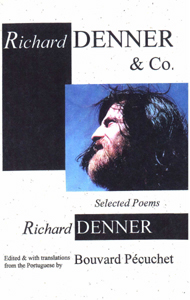
Denner
& Co.
Edited with translations by Bouvard Pécuchet
Cover
by S. Mutt
2003
SALUTATION by
Bouvard Pécuchet
Richard
Denner is not a reincarnation of Fernando Pessoa. They are separate emanations
of the multi-faced God that sneezes in the cosmic air of creativity. Pessoa
deconstructed himself in an age before the philosophy of deconstructualism; Denner is reconstructing himself in a post-post-post
modern age, where philosophy and culture are rapidly disintegrating.
Pessoa lived a quiet life, perhaps
creating his “heteronyms” to make his life interesting. Denner has
been living a full life. He has married three times and has children by his
different wives, who in turn have presented him with grandchildren. He lived in
Berkeley during the fairytale 60s, where he was the Poet of the Berkeley Barb.
He fled Berkeley when the teargas began to fall and traveled to Alaska where he
lived in a cabin in the woods, hunting and fishing for survival. He has worked
at a wide variety of professions—cowboy, tree planter, bookseller,
carpenter, printer. He has drawn his metaphors from his life experience and
written about what he discovered in the world, and he has developed an
elaborate inner life and written from the heart.
As a boy, Richard was charmed by the
shenanigans of Frank Demara, known to the public in the 1950s as The Great
Imposter. Richard saw him interviewed live on The Jack Parr Show. Demara was able to create different personas and find
employment in a vast number of posts—everything from being a medical
doctor in the military to a Latin teacher in a private school. Demara said that
when he picked up a scalpel, it was as though he had used it before. Denner
found an explanation for this, as a freshman at Cal, reading the works of
Plato, where it is said that we know everything but forget it all at birth,
that knowledge is the process of remembering what we have forgotten. Later,
when Denner rediscovered the Dharma of Gotama Buddha, he had a
similar understanding. It is not the Self that is the problem but the
incomplete Self. One solution to the problem of Self is to discover there is no
Self—no Self, no problem. Another solution is the integration of the
various “selves” by allowing them full play—integration, like a drama with a cast, not the conflicting,
schizophrenic isolation of the parts of the personality but an association of
the members of the cast in the play of consciousness, each with their lines,
each in character.
In one of Rychard’s terse,
large-lettered poems, all/over/all/all, I find the Poundian components, logopoeia, melopoeia, and panopoeia.
The poem can be read as temporal all over and as local all over, as
a point of view, over all, and
visually, with the word all being
place over itself. There is formal structure, yet an innovative playfulness is
evident.
There are ontologically questioning
poems by Doug O, the “O” suggesting nothingness or infinite space. There are the “Sensationalist” poems of
Jubal Dolan:
no thinking, here
just looking
and
the romantic-pastoral mode of Luiz Mee (“Luiz” perhaps a tip of the
hat to Luis Garcia, Richard’s long-time friend and mentor). We have the
thinker, the worker, the lover poets, with their different hats, pets and
facial tics. As Rychard once said, “Everything is everywhere, and God is
gift horse, a kind of cornucopia with teeth.”
It is difficult to say exactly when the
personalities first emerged. Most likely it was part of a 9/11 meltdown.
However, I am certain that before our author discovered the works of Fernando
Pessoa & Co. in June of 2003, I, Bouvard Pécuchet, had already begun writing reviews of books that
didn’t exist, and the scattered Buddhist poems of Jampa Dorje had been
collected under one cover. There was the forgery, Another Artaud, as well as works by Rychard from the Berkeley 60s.
The drama was well underway, needing only a bit more prompting by the Muse.
Rychard is here, and we have been joined by Jubal Dolan, Luiz Mee, and Doug O.
Welcome!